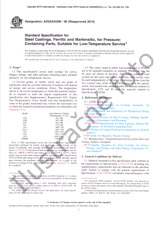Potrebujeme váš súhlas na využitie jednotlivých dát, aby sa vám okrem iného mohli ukazovať informácie týkajúce sa vašich záujmov. Súhlas udelíte kliknutím na tlačidlo „OK“.
ASTM E1661-95a(2018)
Standard Classification for Serviceability of an Office Facility for Meetings and Group Effectiveness (Includes all amendments and changes 2/4/2020).
NORMA vydaná dňa 1.3.2018
Informácie o norme:
Označenie normy: ASTM E1661-95a(2018)
Dátum vydania normy: 1.3.2018
Kód tovaru: NS-810989
Počet strán: 12
Približná hmotnosť: 36 g (0.08 libier)
Krajina: Americká technická norma
Kategória: Technické normy ASTM
Kategórie - podobné normy:
Anotácia textu normy ASTM E1661-95a(2018) :
Keywords:
acoustic separation, building, conference rooms, facility, facility occupants, function, meeting rooms, office, performance, rating, rating scale, requirements, serviceability, workrooms,, ICS Number Code 35.260 (Office machines)
Doplňujúce informácie
| Significance and Use | ||||||||
|
4.1 Each Facility Rating Scale (see Figs. 1-4) in this classification provides a means to estimate the level of serviceability of a building or facility for one topic of serviceability and to compare that level against the level of any other building or facility. 4.2 This classification can be used for comparing how well different buildings or facilities meet a particular requirement for serviceability. It is applicable despite differences such as location, structure, mechanical systems, age, and building shape. 4.3 This classification can be used to estimate the amount of variance of serviceability from target or from requirement, for a single office facility, or within a group of office facilities. 4.4 This classification can be used to estimate the following: 4.4.1 Serviceability of an existing facility for uses other than its present use. 4.4.2 Serviceability (potential) of a facility that has been planned but not yet built. 4.4.3 Serviceability (potential) of a facility for which a remodeling has been planned. 4.5 Use of this classification does not result in building evaluation or diagnosis. Building evaluation or diagnosis generally requires a special expertise in building engineering or technology and the use of instruments, tools, or measurements. 4.6 This classification applies only to facilities that are building constructions, or parts thereof. (While this classification may be useful in rating the serviceability of facilities that are not building constructions, such facilities are outside the scope of this classification.) 4.7 This classification is not intended for, and is not suitable for, use for regulatory purposes, nor for fire hazard assessment nor for fire risk assessment. |
||||||||
| 1. Scope | ||||||||
|
1.1 This classification covers pairs of scales for classifying an aspect of the serviceability of an office facility, that is, the capability of an office facility to meet certain possible requirements to enable work groups or project groups to function effectively and productively. 1.2 Within that aspect of serviceability, each pair of scales, shown in Figs. 1-4, are for classifying one topic of serviceability. Each paragraph in an Occupant Requirement Scale (see Figs. 1-4) summarizes one level of serviceability on that topic, which occupants might require. The matching entry in the Facility Rating Scale (see Figs. 1-4) is a translation of the requirement into a description of certain features of a facility which, taken in combination, indicate that the facility is likely to meet that level of required serviceability. FIG. 1 Scale A.2.1 for Meeting and Conference Rooms FIG. 1 Scale A.2.1 for Meeting and Conference Rooms (continued) FIG. 1 Scale A.2.1 for Meeting and Conference Rooms (continued) FIG. 2 Scale A.2.2 for Informal Meetings and Interaction FIG. 2 Scale A.2.2 for Informal Meetings and Interaction FIG. 3 Scale A.2.3 for Group Layout and Territory FIG. 3 Scale A.2.3 for Group Layout and Territory (continued) FIG. 4 Scale A.2.4 for Group Workrooms FIG. 4 Scale A.2.4 for Group Workrooms (continued) 1.3 The entries in the Facility Rating Scale (see Figs. 1-4) are indicative and not comprehensive. They are for quick scanning to estimate approximately, quickly, and economically, how well an office facility is likely to meet the needs of one or another type of occupant group over time. The entries are not for measuring, knowing, or evaluating how an office facility is performing. 1.4 This classification can be used to estimate the level of serviceability of an existing facility. It can also be used to estimate the serviceability of a facility that has been planned but not yet built, such as one for which single-line drawings and outline specifications have been prepared. 1.5 This classification indicates what would cause a facility to be rated at a certain level of serviceability but does not state how to conduct a serviceability rating nor how to assign a serviceability score. That information is found in Practice E1334. The scales in this classification are complimentary to and compatible with Practice E1334. Each requires the other. 1.6 The values stated in SI units are to be regarded as standard. The values given in parentheses are mathematical conversions to inch-pound units that are provided for information only and are not considered standard. 1.7 This international standard was developed in accordance with internationally recognized principles on standardization established in the Decision on Principles for the Development of International Standards, Guides and Recommendations issued by the World Trade Organization Technical Barriers to Trade (TBT) Committee. |
||||||||
| 2. Referenced Documents | ||||||||
|




 Cookies
Cookies
